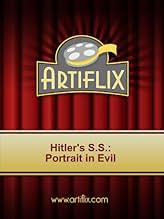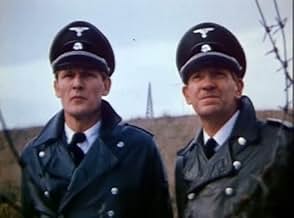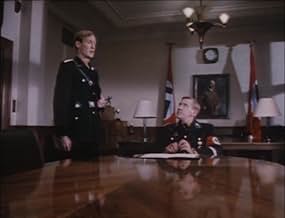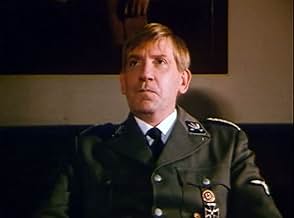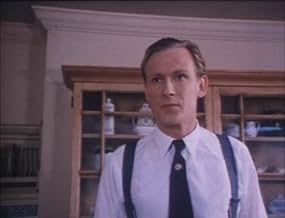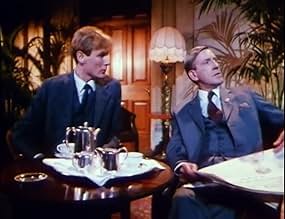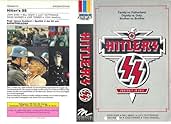Nazis, les hommes du diable
Ajouter une intrigue dans votre langueThe story of Helmut and Karl Hoffmann. Both come of age at the start of Hitler's power in Germany. Helmut joins the SS and eventually becomes a successful flag rank officer. Karl joins the S... Tout lireThe story of Helmut and Karl Hoffmann. Both come of age at the start of Hitler's power in Germany. Helmut joins the SS and eventually becomes a successful flag rank officer. Karl joins the SA and experiences the darker side of Nazism after the SA is disbanded and Karl is thrown i... Tout lireThe story of Helmut and Karl Hoffmann. Both come of age at the start of Hitler's power in Germany. Helmut joins the SS and eventually becomes a successful flag rank officer. Karl joins the SA and experiences the darker side of Nazism after the SA is disbanded and Karl is thrown into prison and later conscripted into the German army. Brother is pitted against brother u... Tout lire
- Réalisation
- Scénario
- Casting principal
Avis à la une
Directed by Jim Goddard from a Lukas Heller screenplay, 'Hitler's SS: Portrait in Evil' is a well-intentioned, but fairly rote made for TV movie suffering from a dull narrative and stilted dialogue. Heller's linear tale charts the rise and fall- not just of the Hoffman brothers- but of the Third Reich, feeling at times like a drab recital from a history book. The affair lacks emotional depth, as well as natural dialogue and impactful characterisation. One has no reason to care for either of the brothers, nor any of the secondary characters, and Heller's attempts to balance historical accuracy with engaging storytelling proves challenging, resulting in an overly didactic piece.
As a chronicle of history, the film works quite well, despite creative licence taken here and there, leading to inaccuracies. Heller's representation of Nazi-era Germany as a hotbed of varying political ideas, as well as the juxtaposition of the SS verses the SA and the Wehrmacht, is mostly on point, making for some interesting moments. However, as a piece of fictional storytelling, attempting to examine themes such as nationalism and brotherhood, as well as how a nation fell under the spell of fascism, the film falls short. In addition, a love triangle sub-plot adds nothing to the piece but more minutes to the runtime.
Furthermore, Ernest Vincze's cinematography does little to aid proceedings. He opts for a very conventional approach, without stylizations or tension-building techniques, such as irregular angles or creative framing, which would have compounded the film's emotional weight. Although he captures the fascist rallies and smoky interiors of the bierkellers effectively, his work is not memorable, nor powerful.
Moreover, Richard Hartley's overly romantic score seems to have been written for a different film entirely. His cloyingly mournful melodies would be more appropriate in an adaptation of a Jilly Cooper dime-store novel; set against the horrors of the Third Reich they seem utterly out of place. Conversely, Eileen Diss and Mike Porter's production design appears faithful to the period, while Elizabeth Waller's costumes carry the weight of authenticity. Although perhaps everything is a bit too clean, the overall visual effect is one of realism.
Bill Nighy and John Shea star as Helmut and Karl Hoffman, respectively, opposite a large cast of well-known performers. Nighy does fine work as Helmut, creating in him a cynical, morally ambiguous character one could imagine rising through the ranks of the SS. On the other hand, Shea opts for a more straightforward approach, playing Karl as a good man; lacking the intrigue, nuance and complexity Nighy fosters.
The supporting cast are a veritable who's who of Hollywood, some of whom do strong work. David Warner is particularly good as the sinister Reinhard Heidrich, a role he played before in Marvin J. Chomsky's far-more effective 'Holocaust.' Lucy Gutteridge does what is required with the under-written role of Mitzi, a nightclub singer, though doesn't make much of an impression. In addition, José Ferrer and Tony Randall bring a gravitas to their all too small roles as a Jewish professor and a doomed comedian.
A straightforward made for TV movie about a fascinating point in history, Jim Goddard's 'Hitler's SS: Portrait in Evil' is a fairly mundane piece of work. The narrative is underwhelming and the dialogue is stilted, although the production design is fairly authentic. While Bill Nighy and some of the supporting cast do strong work, John Shea underwhelms and the cinematography lacks creativity. Unfortunately, 'Hitler's SS: Portrait in Evil' is ultimately a portrait in mediocrity.
In the beginning when the Nazi party is first coming to power we see the life of two young German men. Like everyone else in Germany at that time they too are caught up in Hitler's fanaticism. One brother joins the S.A. and is chided by the other for going along with that "rubbish". But he ends up getting caught up in the S.S. when he is confronted by Heydrich at his university who then persuades him to join not for his beliefs in politics but for his intelligence. Neither knew what they were getting themselves into.
What's most interesting about this story is the emotional aspects. Seeing how the brothers reacted to things that were starting to happen in the Third Reich. It was all minuscule all first. Seeing S.A. officers push an old man down some stairs. The noble but innocent younger brother tries throughout the war to change the evil that was happening all around him but finds that he is blatantly overwhelmed by opposition from his fellow Germans. While the older brother accepts what he cannot change and tries to help his younger brother into being smarter about his actions. Both are forced along a path that is becoming increasingly harder to follow. It definitely shows how some Germans were forced to go along with what was happening or be killed themselves.
The acting in this movie was really well done. My only gripe was that the actors had British accents all throughout the movie which made you wake up from the story and detract from the realism. Some parts I busted up laughing seeing these guys in Nazi uniforms talking in thick British accents. But the acting by the two brothers was very good and believable. It was very emotional to see what they were going through and felt as they watched people die and the world change around them.
Bill Nighy is the cleverer of the two brothers, recognizing the Nazi Party as the coming force in Germany in 1931 and decides to join this elite group. His brother John Shea likes a good time which includes a brawl every now and then. The SA under Ernest Roehm seems like his place in the Nazi movement.
Well we all know what happened to Roehm as his ambitions began to exceed even Hitler's. Shea gets himself tossed into Dachau for a little Nazi style rehabilitation. During the Thirties before the war, places like Dachau were not yet the systematic slaughter camps they later became. Shea eventually is released and is drafted into the army.
In the meantime Nighy becomes an upwardly mobile guy in the S.S. and a special favorite of Reinhard Heydrich, very chillingly played by David Warner.
Through all this Carroll Baker their mother worries about her boys. She's never been crazy about the Nazi movement, she sees what it's doing to Germany and her family. She's most of all concerned with her youngest son who is played by three different juvenile actors who is an enthusiastic member of the Hitler Youth.
What becomes of the Hoffman family is a tale tragically told many times over in Germany of that period. In this most British cast film, Tony Randall as a German comedian with trenchant observations of the time and Jose Ferrer as a Jewish professor have two excellent cameo roles.
No new ground is broken here, but this is a story that deserves retelling thousands of times over.
Le saviez-vous
- GaffesIn the film, Reinhard Heydrich is shown assassinated on a deserted country road in the farmland outside the city of Prague. In reality, Heydrich was attacked in the middle of the city when his car slowed to round a corner at a busy streetcar station.
- Citations
Helmutt Hoffmann: Well, who needs Revolutionaries when the Revolution has already been achieved?
- Versions alternativesIn the version of the film shown on the History Channel's "Movies in Time" series, about 30-45 minutes of dialogue is cut from various scenes and conversations. This was necessary to have the running time under three and a half hours to allow for the Movies in Time commentary and interviews at the beginning and end of the feature.
- Bandes originalesWenn die Soldaten,
sung on train to the Night of the Long Knives
Meilleurs choix
- Hitler's image is taken from:
Détails
- Date de sortie
- Pays d’origine
- Langues
- Aussi connu sous le nom de
- Hitler's S.S.: Portrait in Evil
- Lieux de tournage
- Allemagne(West)
- Sociétés de production
- Voir plus de crédits d'entreprise sur IMDbPro
Contribuer à cette page


